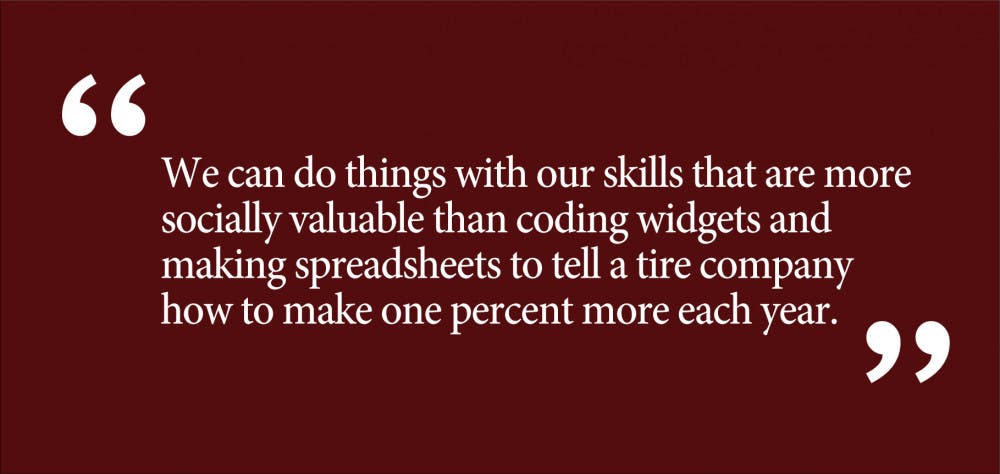The career fair is today. As Brown students weave through a sea of recruiters, they’re likely to see table after table of technology, finance and consulting companies. These large, moneyed corporations have something very attractive to offer students — certainty.
In a 2017 Financial Times piece, senior employees at a handful of management consulting firms described their ideal employees as “insecure overachievers” — workers that are eager to please others by drowning themselves in, and excelling at, their work.
Human resources directors admit that they seek out insecure overachievers and try to “(get) them hooked on the high-status identity of the firm.”
I submit the following to you: If you go to Brown, you are probably an overachiever. In fact, you probably derive a lot of satisfaction from being an overachiever. Otherwise, you probably wouldn’t have spent time in high school studying to ace standardized tests and earning top marks in your classes, all while balancing a smorgasbord of extracurriculars. You’re really good at jumping through hoops.
And, if you’re a graduating senior, you’re probably feeling insecure. I know I am. I worry about leaving the security of an educational institution and jumping headfirst into the job market. Will I find the right job? What if I graduate without finding anything while all my friends get ready to move away and start at a new company?
These companies know that we’re scared and smart, and so they recruit early, scooping up young talent that’s hungry for a start date before they even receive a diploma. I understand that some students choose these roles because they have family to support or massive debt to pay. But for the vast majority of students participating in the recruiting process, this is not the case. Recruiting is appealing because it’s a ticket out of uncertainty and into a high salary and a relocation bonus.
The truth is that most organizations are not large or bureaucratic enough to predict their staffing needs almost a year in advance. Positions in arts, education, public service and many other fields don’t start posting their fall openings until graduation season. It’s scary to wait until the spring to start interviewing for positions, but this timeline is completely normal.
The world needs smart and dedicated people working on big problems. I think we can be some of those people. We can do things with our skills that are more socially valuable than coding widgets and making spreadsheets to tell a tire company how to make one percent more each year. We can do more with our degrees than make a ton of money for someone else. (The average employee of a “Big 3” management consulting firm brings in $400,000 to $500,000 in revenue for the company per year.)
This problem, however, is larger than individual choice. CareerLAB should shift the recruiting landscape for graduating seniors. First, they ought to emphasize that most students do not solidify their post-graduate plans until the spring of their senior year. Second, they could adjust the fee schedule for employers recruiting on campus.
CareerLAB currently offers a reduced fee to nonprofit companies recruiting at Brown. To incentivize greater entry into the nonprofit sector, CareerLAB ought to lower this fee to zero. Conversely, CareerLAB ought to assess an additional surcharge for technology giants, large financial institutions and high-powered consulting firms. These additional fees can be used to expand the Careers in the Common Good program, an initiative that aims to help students pursue nonprofit and public interest careers.
These giant companies aren’t hurting for cash, and they certainly won’t be dissuaded from recruiting at Brown due to a fee hike. Companies like Bain and McKinsey purposefully hire employees from prestigious universities to shore up their own legitimacy. They sell expertise to their clients — what better way to do that than to start growing talent from a crop of newly minted graduates from ultra-selective schools?
It’s up to us to help create the world we want to see. If we want a society where every child can access quality education, where people of color are not subjected to an unfair criminal justice system and where our environment is protected, it’s up to us to choose to work for it, and it’s on Brown to help make that happen.
Ruth Foster ’19 applied to an internship at a hedge fund in a fit of desperation but was deemed “not a good fit” after arguing in her application that Brown should pay higher taxes — in hindsight, this ideological mismatch should have been obvious. She can be reached at ruth_foster@brown.edu. Please send responses to this opinion to letters@browndailyherald.com and op-eds to opinions@browndailyherald.com.





